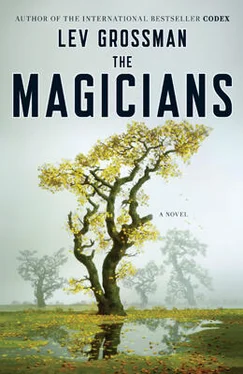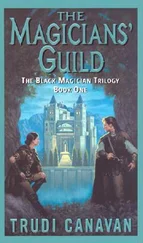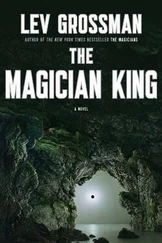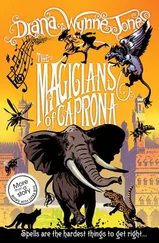They did their best to be good sports about it. On the first day of classes they sat patiently in the library as the new Physical Kids went through the ritual and broke into the Cottage. They’d debated long and earnestly about what to serve the newcomers when they came in, finally settling on a goodish champagne and — not wanting to be selfish, even though that was exactly how they felt — an obscenely expensive array of oysters and caviar with toast points and crème fraîche.
“Cool!” the new Physical Kids said, one after the other, as they made their way inside. They goggled at the oversize interior. They inspected the bric-a-brac and the piano and the cabinet of alphabetized twigs. They looked impossibly young. Quentin and Alice made small talk with them, trying to be witty and knowing, the way they remembered the others having been when they first got there.
Sitting in a row on the couch, the Third Years squirmed and sipped their champagne too quickly, like children waiting to be excused. They asked polite questions about the paintings and the Cottage library. Do the books circulate outside the building? Did they really have a first-edition Abecedarian Arcana in the hand of Pseudo-Dionysius himself? Really. And when was the Cottage first constructed? Really! Wow. That’s old. That’s, like, ancient .
Then, after a suitable interval, they disappeared en masse into the pool room. They showed no particular desire to be chaperoned there, and Quentin and Alice had no particular desire ever to see them again, so they stayed where they were. As the evening wore on, the sounds of adolescent bonding could be heard. It became apparent to Quentin and Alice that they were relics of an earlier era that had worn out its welcome. They had come full circle. They were outsiders again.
“I feel like an elderly docent,” Quentin said.
“I already forget their names,” Alice said. “They’re like quadruplets.”
“We should give them numbers. Tell them it’s a tradition.”
“And then we could always call them by the wrong number. Freak them out. Or we could call them all the same thing. Alfred or something.”
“Even the girls?”
“Especially the girls.”
They were sipping tepid leftover champagne. They were getting drunk, but Quentin didn’t care. From the pool room came the glittery tinkle of breaking glass — a champagne flute, probably — and then, a little later, the sound of a sash being raised and somebody throwing up, hopefully out the window.
“The problem with growing up,” Quentin said, “is that once you’re grown up, people who aren’t grown up aren’t fun anymore.”
“We should have burned this place down,” Alice said gloomily. They were definitely drunk. “Been the last ones out the door and then torched it.”
“Then walked away with it burning behind us in the background, like in a movie.”
“End of an era. End of an epoch. Which one? Era or epoch? What’s the difference?”
Quentin didn’t know. They would have to find something else, he thought mazily. Something new. Couldn’t stay here anymore. Couldn’t go back. Only forward.
“Do you think we were ever like this?” Quentin asked. “Like these kids?”
“Probably. I bet we were even worse. I don’t know how the others put up with us.”
“You’re right,” he said. “You’re right. God, they were so much nicer than we are.”
That winter Quentin didn’t go home for the holidays. Around Christmas-time — real-world Christmas — he’d had the usual conversation with his parents about Brakebills’ unusual schedule, which he had to remind them about every year, lounging inside the old phone booth under the back stairs with one foot braced up against the folding wooden door. Then by the time Brakebills-calendar Christmas rolled around, it was already March in the real world, and it didn’t seem like such a big deal not to go back. If they had asked him — if they’d put it out there for an instant that they were eager to see him, or that they would be disappointed if he didn’t come — he might have caved. He would have, in a second. But they were their usual blithe, oblivious, glassine selves. And besides, he got an independent feeling from coolly informing them that he had other plans, thanks very much.
Instead Quentin went home with Alice. It was her idea, though as it got closer to the holidays Quentin wasn’t exactly sure why she’d invited him, since the prospect obviously made her suicidally uncomfortable.
“I don’t know, I don’t know!” she said when he asked her. “It just seemed like the kind of things boyfriends and girlfriends do!”
“Well, whatever, I don’t have to come. I’ll just stay here. Just say I had a paper to finish or something. I’ll see you in January.”
“But don’t you want to come?” she wailed.
“Of course I do. I want to see where you come from. I want your parents to know who I am. And God knows I’m not taking you back to my parents’ house.”
“All right.” She didn’t sound any less anxious. “Do you promise to hate my parents as much as I do?”
“Oh, absolutely,” Quentin said. “Maybe even more.”
The opening of the portals home for vacation was always a complicated and tedious procedure that inevitably led to huge numbers of Brakebillians backed up with all their luggage in a ragged line that wound down the dark, narrow corridor leading to the main living room, where Professor Van der Weghe was in charge of getting people where they needed to go. Everybody was relieved that exams were over, and there was always a lot of giddy pushing and shoving and shrieking and casting of minor pyrotechnic spells. Quentin and Alice waited together in silence with their packed bags, solemnly, side by side, Quentin looking as respectable as he could manage. He hardly had any clothes anymore that weren’t part of his Brakebills uniform.
He knew Alice was from Illinois, and he knew Illinois was in the Midwest, but he couldn’t have pointed to the precise location of that state within a thousand miles. Apart from a European vacation in junior high he’d barely ever been off the East Coast, and his Brakebills education hadn’t done much to improve his grasp of American geography. And as it turned out he hardly saw Illinois anyway, or at least not its exterior.
Professor Van der Weghe set up the portal to open directly into an anteroom inside Alice’s parents’ house. Stone walls, flat mosaic floors, post-and-lintel doorways on all sides. It was a precise re-creation of a traditional bourgeois Roman residence. Sound echoed in it like a church. It was like stepping past the red velvet rope at a museum. Magic tended to run in families — Quentin was an exception in that respect — and Alice’s parents were both magicians. She had never had to sneak around behind their backs the way he had to with his parents.
“Welcome to the house that time forgot to forget,” Alice said sulkily, kicking her bags into a corner. She led him by the hand along an alarmingly long, dark corridor to a sunken living room with cushions and hard Roman-style couches strewn around at careless angles and a modest plashing fountain in the middle.
“Daddy changes it all around every few years,” she explained. “He mostly does architectural magic. When I was little it was all Baroque, gold knobs on everything. That was almost nice. But then it was Japanese paper screens — you could hear every thing. Then it was Fallingwater — Frank Lloyd Wright — until Mom got sick of living in a mildew farm for some reason. And then for a while it was just a big old Iroquois longhouse with a dirt floor. No walls. That was hilarious. We had to beg him to put in a real bathroom. I think he seriously thought we were going to watch him defecate into a pit. I doubt even the Indians did that.”
Читать дальше












